Two months ago, I bitterly learned that the calligrapher of the tomos of autocephaly of the Ukrainian church was an Athonite monk.1 According to the call of my conscience, being myself an Athonite, I wanted to write something about it. Thus, I read the text of the tomos after it was published on the site of the Ecumenical Patriarchate and wrote the following remarks. But in the end, I did not publish them, waiting for others (more competent and well-informed) to speak out on this theme orally and in writing. Much has been written and said about the tomos recently, and I wouldn’t have thrown my own mite in if it hadn’t become recently known that four or five Athonite monasteries responded positively to the invitation from Epiphany [the schismatic primate—Trans.] sent to the Sacred Community to send a delegation to his enthronement,2 and that two or three Athonites (including the abbot of the hieromonk who wrote the tomos) were members of the delegation of the Patriarchate of Constantinople at the enthronement.
Therefore, I present my observations and apprehensions arising from a study of the tomos.
After the first introductory paragraph of the tomos, the following words, concerning the main theme of Ukrainian autocephaly, begin with a mistake (and a gross mistake at that): The text says that the Church leaders of Ukraine have supposedly been fervently asking for Church independence for their country for thirty years (verbatim: “Ukraine has been fortified and magnified by heavenly providence, while also acquiring comprehensive political independence, and inasmuch as its civil and church leaders have avidly sought its ecclesiastical self-administration over more than thirty years…”), which actually is not true, inasmuch as those deposed and excommunicated from the Church or non-ordained cannot be called the ecclesiastical leaders of their country, especially when they are followed by only a small part of the faithful.
Continuing with the text “we determine and declare,” it is written “that the entire Orthodox Church contained within the boundaries of the … State of Ukraine, with its sacred Metropolitan, Archdiocesan and Episcopal sees, its monasteries and parishes, as well as all the ecclesiastical institutions therein … shall hereafter exist as canonically autocephalous … having and recognizing as its First Hierarch in all church matters its presiding canonical Primate,” whom the last paragraph of the text explains is Epiphany!
Without even thinking about whether the Patriarch has the right to unilaterally define and solve the complex Ukrainian question, anyone would ask himself: Did the metropolias and dioceses of the ninety bishops, containing about 12,500 parishes, 250 monasteries, and 5,000 monastics, and other numerous institutions of the autonomous Ukrainian Church, under the Moscow Patriarchate, really cease to exist? Or did they unite with Epiphany’s schismatics? We know that didn’t happen. What then applies to them in accordance with the provisions introduced by the tomos? Will they be subject to Epiphany or will they now become anti-canonical and unlawful from the ecclesiastical point of view? Indeed, such a conclusion arises from reading the text! And, therefore, for those who recognize the tomos as valid, the Church that was until recently “the only canonical Church of Ukraine” (according to the declaration of the Patriarchate of Constantinople itself), is now unlawful!
Does anyone wonder what canonical crime these people committed that the Patriarch of Constantinople treated them this way? Maybe they’re guilty of not wanting to become autocephalous and enter into communion with unrepentant schismatics?
The text of the tomos goes on to say that “we recognize and declare this” newly-created “Autocephalous Church … as our spiritual daughter, and recommend that all Orthodox Churches throughout the world acknowledge” it as a sister. But what these relationships between autocephalous Churches mean is not explained. Does it mean that in addition to the other obligations that the new church takes upon itself before the Patriarchate (which the statutes speak about more clearly), it will also be morally obliged to obey? And that other autocephalous Churches are like daughters before Constantinople (and sisters among themselves)?
However, it’s stated somewhat differently later on: “In addition to the above, we declare that the Autocephalous Church in Ukraine knows as its head the most holy Apostolic and Patriarchal Ecumenical Throne, just as the rest of the Patriarchs and Primates also do.” Does no one really question how an autocephalous Church has another Church as its head, after all (as we know), the Head of the Orthodox Church is our Lord Jesus Christ and not any patriarchal see (cf. Eph. 5:23, Col. 1:18).
Further, the text says that parishes already existing outside the state are from now on subject to “the order of the Ecumenical Throne, which has canonical authority in the diaspora.” But to what diaspora this refers is again not explained: to the Ukrainian diaspora or to the Orthodox diaspora in general? If it applies to the Orthodox diaspora (most likely), then why do so many other Patriarchates (Antiochian, Moscow, Serbian, Romanian, etc.) have bishops and parishes abroad, in countries that do not belong to another autocephalous Church? Perhaps the order and jurisdiction that the tomos refers to regarding the diaspora is not generally recognized?
But the crown of all the above-enumerated problems is the following provision. The text talks about how hierarchs and other clergy of the new church will have the right “to address petitions of appeal to the Ecumenical Patriarch, who bears the canonical responsibility of irrevocably passing judgment over matters related to bishops and other clergy in local Churches, in accordance with the sacred Canons 9 and 17 of the Fourth Ecumenical Council in Chalcedon.” However, anyone who has the chance to open and read The Pedalion [The Rudder—Trans.] of St. Nikodemos of the Holy Mountain will find that the two rules mentioned above by the tomos apply only to the clergy of the Ecumenical Patriarchate, not to the clergy of other Patriarchates. At present, the autocephalous Local Churches do not recognize this privilege of the Patriarchate of Constantinople.3 Thus, the recognition of the tomos as legitimate implies the recognition of a very great “privilege” for the Patriarchate of Constantinople, which, rather, should only be worthy of the supposedly infallible Pope of Rome, and not of an Orthodox hierarch or throne.
Thus, based on the above, I think that the “calligraphy” of the tomos of autocephaly looks like a charter for the division of the Orthodox. Of course, I hope that the Lord will turn this division into unity in truth.

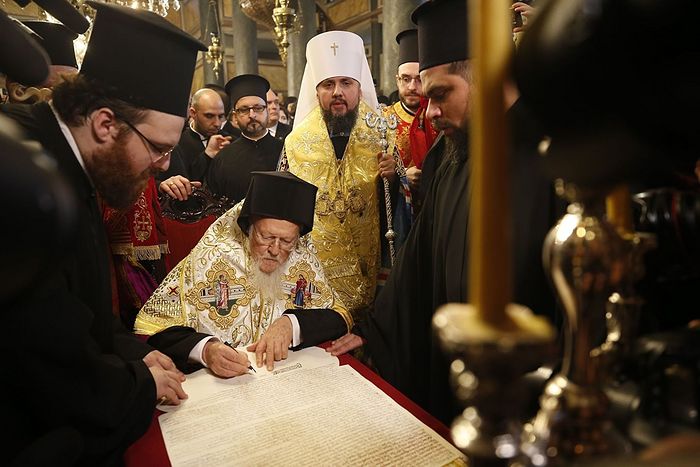
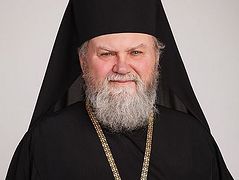
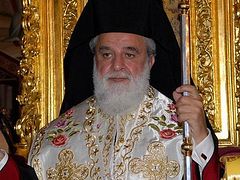
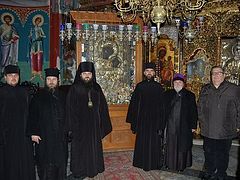
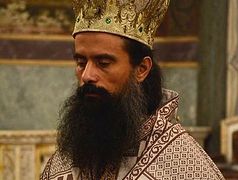
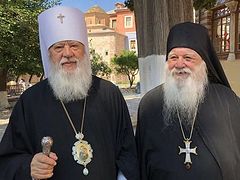
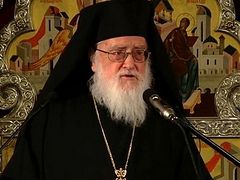
Yes! By all means, pray for him, because it is people like him who most need our prayers. It is not for us to sit in judgement of others and declare them incapable of redemption.
@Isidora
You are allowing (justified) anger to cloud your judgement and go too far in your criticism. Things are never as simple as they seem. Bartholomew and his cabal have erred, and erred greatly, but to say that an entire autocephalous Church has abandoned Orthodoxy is to go a step too far. As is the claim that Mount Athos, which is made up of far more than the four problematic monasteries, "is fallen" as a whole.
St. Gabriel the Fool for Christ, who just so happens to be a Georgian. We shouldn't place too much trust in 'prophecies', in particular when then there is reason to suspect that they are no more than the product of one man's love for his own country. As numerous Church Fathers have testified through the ages, not all visions are from God.
So, let's lay off the doom and gloom, and always keep the hope of Resurrection in our hearts. God is always with us - all of us - and so are his siants.
There are prophecies about the falling of Mount Athos: women being allowed there and the Icon of the Mother of God from Iveron leaving the Mountain on water and going back to Iveron (Georgia).
According to St. Gabriel the Fool for Christ, Georgia is going to be the only area protected by the Theotokos in the times to come.
May God help us!
The epitome of lukewarmness, is to verbally oppose uncanonical actions or heresies in the Church……..and then do nothing.
Now is the time to eliminate the grey areas!
World Orthodoxy either went along with it or stood by and did nothing effective (disrupting communion for a brief period is nothing). Things proceed from there with accumulating bites, ignored by World Orthodoxy.
Now we have Ukraine. World Orthodoxy reacts same way, all talk, trying to outdo each other in clever assessment. Next pander to LGBTQIP.
Athos is fallen--nothing but a tourist trap.
Defrocking is the solution, otherwise we're in trouble.
May God help us!